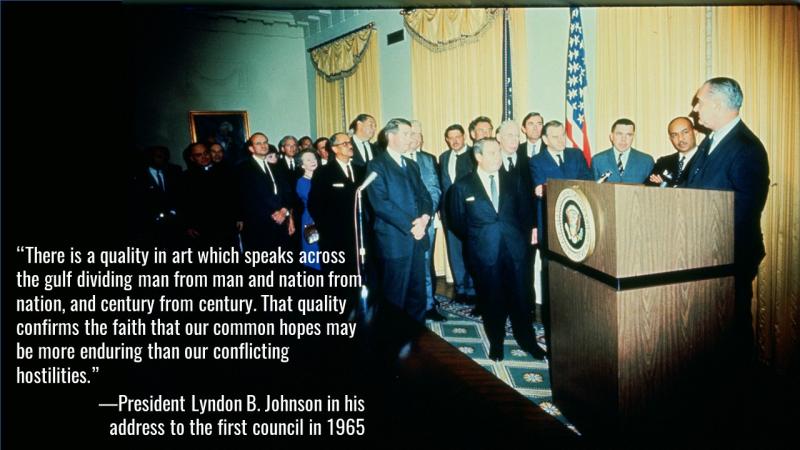What Is the NEA?

Photo by R. Philip Hanes, Jr.
Overview
The National Endowment for the Arts (NEA), established in Congress in 1965, is an independent federal agency that is the largest funder of the arts and arts education in communities nationwide and a catalyst of public and private support for the arts. By advancing opportunities for arts participation and practice, the NEA fosters and sustains an environment in which the arts benefit everyone in the United States.
The NEA’s primary activities include grantmaking to nonprofit arts organizations, public arts agencies and organizations, colleges and universities, federally recognized tribal communities or tribes, and individual writers and translators. Grant applications are reviewed by panels of arts experts and individuals from across the country. All grants must be matched one-to-one by nonfederal sources, except for individual grants to writers and translators. NEA funding is appropriated by Congress annually. For a quick overview of our grants process, check out our animated video.
While the NEA’s primary activity includes grantmaking, it also is a national leader in the field and a convener on issues important to the arts community and people working at the intersections of arts and other fields such as health, community development, and education, among others. The NEA is an important resource for research on the value and the importance of the arts, and shares that information with stakeholders and the public.
Together, the Arts Endowment's activities support bringing meaningful arts experiences to all Americans, helping to ensure that everyone in the country has the opportunity to live artful lives.
Funding Opportunities
The NEA has three project-based grant opportunities for organizations: Grants for Arts Projects in specific disciplines; Challenge America grants for projects reaching underserved communities; and the Our Town creative placemaking grants that support programs integrating arts, culture, and design activities into community projects. The NEA’s Partnership Agreements fund the state arts agencies in 56 states and jurisdictions and six regional arts organizations.
The NEA offers two funding opportunities in research: Research Grants in the Arts funds research that investigates the value and impact of the arts, and NEA Research Labs funds transdisciplinary research teams grounded in social and behavioral sciences.
NEA funds Literature Fellowships for translation and creative writing in prose and poetry, the only individual grants that the NEA awards.
Honorifics
The NEA presents two lifetime achievement awards: NEA Jazz Masters Fellowships, the nation’s highest honor in jazz, and National Heritage Fellowships, the nation’s highest honor in the folk and traditional arts. In addition, the NEA solicits nominations from the public for the National Medal of Arts, the highest award given to artists and arts patrons by the U.S. government and presented by the President.
Partnerships and Initiatives
The NEA works with other federal agencies, state and local governments, state arts agencies and regional arts organizations, and private nonprofits on initiatives that provide opportunities for thousands of Americans to experience quality arts programming throughout the country. You can find more information on this programming on the Initiatives page.
Publications About the NEA
These publications provide a good overview of the agency’s work since its beginnings in 1965.
Annual Reports, 1965 to present
Provide a look at NEA activities in each fiscal year of the agency's history.
Guide to the National Endowment for the Arts
This online publication provides details on the programs and activities that the NEA supports and links to various areas of the agency website that will help you better navigate the site and find the material you are seeking. Updated 2024
National Endowment for the Arts: A History 1965-2008
This publication documents the agency's major activities since its creation by the U.S. Congress in 1965. Also included are overviews of the agency's impact on dance, literature, media arts, museums, music, opera, theater, and visual arts. 2009
A Legacy of Leadership: Investing in America's Living Cultural Heritage Since 1965
Celebrating the NEA's 35th anniversary, this publication highlights more than 50 important NEA-funded projects that made a lasting difference to communities, individuals, and organizations. 2000
National Endowment for the Arts, 1965-2000: A Brief Chronology of Federal Support for the Arts
A thumbnail history of the first 35 years of the federal government's support for the arts and the achievements of the NEA since its inception. 2000
Timeline of NEA Highlights
Each year, the National Endowment for the Arts awards thousands of grants to organizations and individuals throughout the nation. We created this timeline to feature some of the stellar projects and artists the NEA has supported over the last 50+ years. Find a year in any decade and read about a project, arts organization, or artist that we supported that year.
Milestone Videos
In 2015, for the 50th anniversary of the NEA, the agency produced a series of milestone videos that highlighted some of the artists, arts organizations, and arts programs that the NEA has supported over its history.
American Film Institute
Applalshop
Maya Lin
National Council for the Traditional Arts
Steppenwolf Theatre Company
Sundance Institute
Edward Villella
Walker Art Center
A Look at Arts Education
Creative Forces
NEA Literature Fellowships
NEA Chairs
Roger Stevens (1965-69)
Nancy Hanks (1969-77)
Livingston Biddle (1977-81)
Frank Hodsoll (1981-89)
John Frohnmayer (1989-92)
Jane Alexander (1993-97)
Bill Ivey (1998-2001)
Michael Hammond (2002)
Dana Gioia (2003-09)
Rocco Landesman (2009-12)
Jane Chu (2014-18)
Mary Anne Carter (2019-21)
Maria Rosario Jackson, PhD (2021-25)

